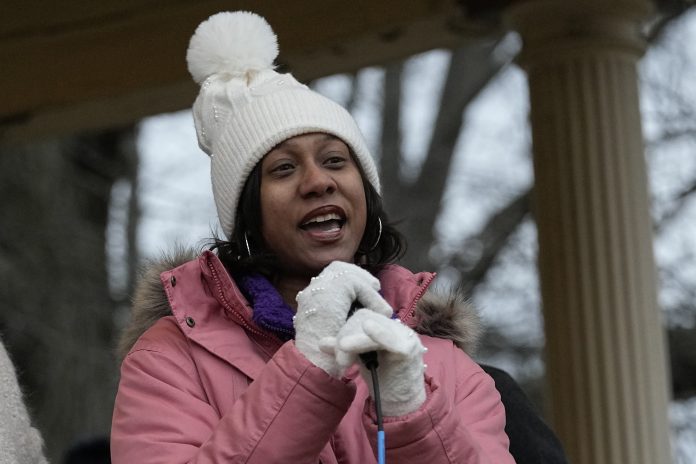A grand jury in Ohio decided on Thursday not to charge Brittany Watts, a 34-year-old woman, with abuse of a corpse in connection with her handling of a home miscarriage.
The Trumbull County prosecutor’s office announced that grand jurors declined to return an indictment, bringing resolution to a case that garnered national attention. This case had significant implications for pregnant women, particularly as states across the country were grappling with new laws on reproductive health care access following the overturning of Roe v. Wade.
The decision came just hours before a planned “We Stand With Brittany!” rally on Warren’s Courthouse Square, where approximately 150 supporters had gathered. Watts, who was among the speakers at the event, expressed gratitude to her community for the support she received during this challenging time. She emphasized her connection to Warren, Ohio, where she was born, raised, and graduated high school, stating her commitment to continuing the fight.
Watts’ lawyer, Traci Timko, acknowledged the outpouring of support through emails, letters, calls, donations, and prayers from the public. Timko highlighted the harsh reality of miscarriage and expressed relief that justice was served with the grand jury’s decision.
The case began when a municipal judge found probable cause to bind over Watts after she allegedly miscarried, clogging the toilet and disposing of some contents outdoors, leaving the 22-week-old fetus lodged in the pipes. Watts had sought medical attention at Mercy Health-St. Joseph’s Hospital but faced delays in treatment, ultimately leaving without being treated. The subsequent police investigation led to the felony charge against her.
During court proceedings, the issue was framed not around the cause of the fetus’s death but the manner in which it was handled, with emphasis on it being left in the toilet while Watts continued with her day. An autopsy determined that the fetus died in utero with no recent injuries.
Watts, who had no criminal record, faced criticism and accusations, with her lawyer arguing that she was being unfairly targeted for something that occurs regularly. The lack of clear definitions in Ohio’s abuse-of-corpse statute, including terms like “human corpse” and “outrage” to “reasonable” sensibilities, was also highlighted during the legal proceedings.
Trumbull County Prosecutor Dennis Watkins, while expressing respectful disagreement with the lower court’s application of the law, stated that their follow-up investigation found Watts committed no crime.
Black reproductive rights group In Our Own Voice and Ohio Physicians for Reproductive Rights, a supporter of reproductive health care access, expressed relief at the grand jury’s decision. They highlighted the broader issue of legal threats faced by Black women for pregnancy loss, calling for an end to the “dangerous trend” of criminalizing reproductive outcomes. Watts and her lawyer hope that her story can be a catalyst for change through education and legislation, preventing other women from enduring similar challenges in the future.


